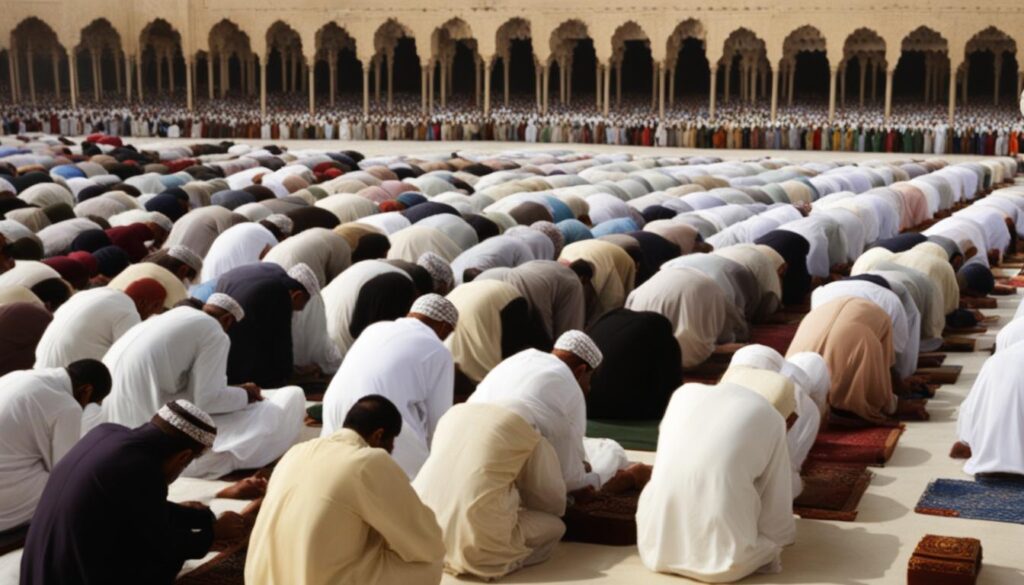Welcome to our beginner’s guide on how to pray in Islam! This comprehensive guide is designed to help individuals, whether they are new to Islam or have been practicing for a while, learn the basics of Islamic prayer. Prayer holds a significant place in Islam, and it is essential to understand the purpose, steps, and common mistakes to avoid for a fulfilling prayer experience.
Key Takeaways:
- Islamic prayer is a fundamental pillar of Islam, serving as a means of worship and connection with Allah.
- Before starting the prayer, Muslims must perform wudu, a purification ritual that cleanses the body and the soul.
- The prayer consists of specific movements and recitations, including standing, bowing, prostrating, and sitting.
- There are five obligatory prayers in Islam: Fajr, Dhur, Asr, Maghrib, and Isha, each having specific times and number of units.
- To ensure a valid prayer, it is important to follow the conditions and pillars of prayer, such as facing the qibla and reciting the required components.
Why Do Muslims Pray in Islam?
Muslims believe that prayer is one of the fundamental pillars of Islam and a way to worship Allah. Prayer serves as a means of seeking guidance, expressing gratitude, seeking forgiveness, and strengthening the connection with Allah. It is an act of submission and devotion, fulfilling the purpose of a Muslim’s existence, which is to worship Allah alone.
Prayer holds immense importance in Islam, as it allows Muslims to establish a direct line of communication with Allah. It is a form of spiritual purification and a way to seek blessings and mercy from the Almighty. Through prayer, Muslims acknowledge their dependency on Allah and their need for His guidance and support in all aspects of life.
Additionally, prayer serves as a reminder of one’s duty to Allah and the commitment to follow the teachings of Islam. It helps Muslims develop discipline, mindfulness, and a sense of humility. Prayer also acts as a source of solace and peace, providing a moment of tranquility amidst the challenges of life.
In summary, prayer in Islam holds great significance as a means of worship, guidance, and connection with Allah. It is a way for Muslims to express gratitude, seek forgiveness, and establish a stronger relationship with the Almighty. Prayer offers spiritual purification, discipline, and a sense of solace, reminding Muslims of their purpose and commitment to Islam.
How to Perform Wudu: Step-by-Step Guide
Before starting the prayer, Muslims must perform wudu, a ritual purification process. Wudu involves washing specific parts of the body, ensuring physical and spiritual cleanliness. Here is a step-by-step guide on how to make wudu correctly:
Step 1: Begin with the intention
Make the intention in your heart to perform wudu for the purpose of prayer. Remember that sincerity is key in all acts of worship.
Step 2: Start with washing the hands
Begin by washing your hands up to the wrists three times, making sure to rub between the fingers and cleanse the entire hand.
Step 3: Cleanse the mouth and nose
Take a handful of water and rinse your mouth three times, ensuring that the water reaches the entire mouth. Then, using the same water, sniff water into your nose and blow it out gently, repeating this process three times.
Step 4: Wash the face
With clean water, wash your face from the hairline to the chin, making sure to cover the entire surface. Repeat this step three times.
Step 5: Cleanse the arms
Start by washing the right arm up to the elbow three times, ensuring that every part is covered. Repeat this process for the left arm.
Step 6: Wipe the head
Moisten your hands and wipe the entire head, starting from the front to the back and then bringing them back to the front. This step should be performed only once.
Step 7: Cleanse the feet
Finally, wash your right foot up to the ankle three times, making sure to clean every part. Repeat the process for the left foot.
After completing these steps, you have successfully performed wudu and are now ready to engage in prayer with a state of purity.

Step-by-Step Guide to Performing the Prayer
Performing the prayer, also known as salah, is a crucial aspect of Islamic worship. It is essential to understand the step-by-step process to ensure the prayer is performed correctly and with reverence. This guide will break down the prayer into its essential steps, providing a clear understanding of each movement and recitation involved.
The Essential Steps of the Prayer
1. Takbiratul Ihram: Begin the prayer by saying “Allahu Akbar” (Allah is the Greatest) while raising your hands to shoulder level.
2. Qiyam: Stand upright, facing the qibla (the direction of the Kaaba in Mecca). Place your hands on your chest, right hand over the left.
3. Recitation: Begin the prayer by reciting Surah Al-Fatiha, the opening chapter of the Quran.
4. Ruku: Bow down, placing your hands on your knees and keeping your back straight.
5. Qawmah: Rise from the bowing position, standing upright again.
6. Sujood: Prostrate, placing your forehead, nose, hands, knees, and toes on the ground.
7. Jalsa: Sit momentarily between the two prostrations.
8. Salam: Conclude the prayer by turning your head to the right and saying “Assalamu alaikum wa rahmatullah” (Peace be upon you and the mercy of Allah), then turning to the left and repeating the same phrase.
It is essential to follow the proper order and observe proper pronunciation when reciting the Arabic phrases during each step of the prayer. Remember to maintain focus and reverence throughout the prayer, seeking a connection with Allah through this act of worship.

As you become more comfortable with the prayer, you may also incorporate additional voluntary prayers, known as Sunnah and Nafl prayers, before or after the obligatory prayers. These additional prayers provide an opportunity for further devotion and spiritual connection.
| Common Mistakes to Avoid | How to Correct |
|---|---|
| Incorrect pronunciation of Arabic phrases. | Seek guidance from a knowledgeable person and practice the correct pronunciation. |
| Improper positioning during ruku and sujood. | Ensure your back is straight during ruku and that all body parts are in contact with the ground during sujood. |
| Forgetting or skipping certain steps. | Refer to a prayer guide or seek guidance to memorize and observe all the necessary steps. |
By following this step-by-step guide, you can perform the prayer in a manner that fulfills your spiritual obligations and brings you closer to Allah. Remember that prayer is a continuous journey of faith and devotion, and with practice and dedication, it will become a source of peace and tranquility in your life.
Understanding the Different Prayers: Fajr, Dhur, Asr, Maghrib, and Isha
In Islam, Muslims are required to perform five daily prayers known as Fajr, Dhur, Asr, Maghrib, and Isha. Each prayer has its specific time of the day and a designated number of rakahs (units) that need to be performed. Understanding these different prayers is essential for every Muslim to fulfill their religious obligations.
Fajr: The Fajr prayer is performed before sunrise and consists of two rakahs. It is considered the first prayer of the day and holds great significance in starting the day with devotion and remembrance of Allah.
Dhur: The Dhur prayer is performed in the midday, after the sun has passed its zenith, and consists of four rakahs. It is an important prayer that helps Muslims pause their activities and take a moment to connect with Allah in the midst of their busy day.
Asr: The Asr prayer is performed in the afternoon, usually between mid-afternoon and sunset, and consists of four rakahs. It serves as a reminder for Muslims to seek peace and tranquility in their busy lives, turning to Allah for guidance and support.
Maghrib: The Maghrib prayer is performed just after sunset and consists of three rakahs. It marks the end of the day and the beginning of the evening, allowing Muslims to express gratitude for the blessings of the day and seek forgiveness for any shortcomings.
Isha: The Isha prayer is performed after twilight has completely disappeared and consists of four rakahs. It is the final prayer of the day, offering an opportunity for Muslims to reflect on their actions, seek forgiveness, and seek protection and guidance from Allah during the night.
| Prayer | Time | Number of Rakahs |
|---|---|---|
| Fajr | Before sunrise | 2 |
| Dhur | Midday | 4 |
| Asr | Afternoon | 4 |
| Maghrib | Just after sunset | 3 |
| Isha | After twilight | 4 |
Common Mistakes to Avoid in Prayer
When learning how to pray in Islam, beginners may encounter some common mistakes that can hinder their prayer experience. It’s important to be aware of these mistakes and strive to correct them in order to perform the prayer correctly and with sincerity. Here are some common mistakes to avoid in Islamic prayer:
- Lack of Focus: One of the key aspects of prayer is maintaining focus and concentration. It is important to clear the mind from distractions and focus solely on the act of worship. Avoid thinking about worldly matters or allowing your mind to wander during prayer.
- Inconsistent Recitation: Proper recitation of the Quranic verses and supplications is crucial in prayer. Pay attention to the pronunciation and recite the words correctly. Inconsistencies in recitation can detract from the essence and beauty of the prayer.
- Incorrect Positioning: The physical movements and postures in prayer have specific guidelines. It is important to learn and follow the correct positions, such as standing straight, bowing with the back parallel to the ground, and prostrating with the forehead and nose touching the ground. Incorrect positioning can affect the validity of the prayer.
- Skipping or Rushing Steps: Prayer is a comprehensive act of worship that involves several steps and movements. Avoid rushing through the prayer or skipping any essential steps. Take your time and ensure each movement is performed with clarity and focus.
These are just a few examples of common mistakes that beginners may make in their prayer. By being mindful of these errors and actively working to correct them, individuals can improve their prayer practice and deepen their connection with Allah.

Words of Wisdom
“Prayer is an opportunity to communicate with Allah, so strive to make it a meaningful and sincere experience. Correcting your mistakes and improving your prayer is a continuous journey of self-reflection and spiritual growth.”
| Mistake | Correction |
|---|---|
| Lack of Focus | Clear the mind from distractions and focus solely on the act of worship. |
| Inconsistent Recitation | Pay attention to pronunciation and recite the words correctly. |
| Incorrect Positioning | Learn and follow the correct positions as per Islamic guidelines. |
| Skipping or Rushing Steps | Take your time, avoid rushing, and ensure each movement is performed correctly. |
The Conditions and Pillars of Prayer
In addition to the physical and procedural aspects, prayer in Islam has specific conditions and pillars that must be fulfilled for the prayer to be valid. Understanding and adhering to these conditions is essential for a valid prayer.
Conditions of Islamic Prayer
- State of Ritual Purity: Before performing the prayer, one must be in a state of ritual purity by performing wudu (ablution) or ghusl (full bath) if necessary.
- Facing the Qibla: The Qibla is the direction of the Kaaba in Mecca, Saudi Arabia, and Muslims must face it during the prayer.
- Covering the Aurah: Both men and women must ensure that their body is appropriately covered during the prayer, following the guidelines of modesty in Islam.
- Time: Prayers have specific times during the day when they are performed, and it is important to offer them within their designated time frame.
Pillars of Salah
The pillars of salah refer to the essential acts that must be performed for the prayer to be valid. These pillars include:
- Standing: The prayer should ideally be performed while standing, unless one is unable to do so due to a valid reason.
- Recitation of Surah Al-Fatiha: The opening chapter of the Quran, Surah Al-Fatiha, must be recited during every unit of the prayer.
- Rukoo and Sujood: Bowing (ruku) and prostrating (sujood) are integral parts of the prayer and must be performed correctly.
- Order and Continuity: The various actions within the prayer, such as recitation, bowing, and prostrating, must be performed in the correct order and without unnecessary gaps or pauses.
By fulfilling the conditions and pillars of prayer, Muslims ensure that their prayers are valid and accepted by Allah. It is important to learn and understand these requirements to perform the prayer with sincerity and devotion.
Tips for Beginners to Improve their Prayer
As a beginner in learning how to pray in Islam, there are several tips that can help you improve your salah and deepen your spiritual connection. Here are some beginner-friendly tips:
- Find a quiet and peaceful space: Choose a place where you can concentrate and minimize distractions. This will allow you to focus solely on your prayer and create a serene environment.
- Maintain concentration: Clear your mind of any worldly thoughts and focus on the presence of Allah. Remember that prayer is a time to communicate with Him, so strive to be fully present and attentive.
- Seek knowledge: Take the time to study and understand the meaning of the supplications and recitations in your prayer. This will not only enhance your understanding but also increase the depth of your connection with Allah.
In addition to these tips, it is important to be consistent in your prayer practice. Regularly performing your salah will help you develop a routine and strengthen your relationship with Allah. Remember that improvement takes time and patience, so be kind to yourself as you embark on this spiritual journey.
By implementing these tips, you will be well on your way to improving your prayer experience and nurturing a stronger bond with Allah. May your journey of learning and practicing Islamic prayer be filled with peace, tranquility, and spiritual growth.
Conclusion
Prayer is a fundamental aspect of Islam, and for beginners, learning how to perform it properly is of utmost importance. This comprehensive guide has provided a simple and concise overview of the basics of Islamic prayer, from the necessary preparations to the step-by-step movements and recitations.
By following this guide, beginners can embark on their prayer journey with confidence and gradually deepen their spiritual connection with Allah. It is essential to remember that prayer is not just a physical act, but a means of seeking guidance, expressing gratitude, seeking forgiveness, and strengthening the bond with Allah.
As beginners continue their prayer practice, it is crucial to seek knowledge and understanding, as this will further enhance their experience. By finding a peaceful space, maintaining concentration, and exploring the meanings behind the supplications and recitations, beginners can build a strong prayer foundation and establish a lasting connection with the Divine.
FAQ
What is the purpose of prayer in Islam?
Muslims pray in Islam as a means of seeking guidance, expressing gratitude, seeking forgiveness, and strengthening their connection with Allah. It is an act of submission and devotion, fulfilling the purpose of a Muslim’s existence, which is to worship Allah alone.
How do I perform wudu (ablution) correctly?
To perform wudu correctly, follow these steps: Wash your hands, mouth, nose, face, arms, head, and feet. Properly performing wudu ensures physical and spiritual cleanliness, preparing you for prayer.
What are the steps of performing the prayer in Islam?
The prayer involves standing, reciting the opening chapter of the Quran (Surah Fatiha), bowing, prostrating, sitting, and offering supplications. Follow the proper order and correct pronunciation of the Arabic phrases.
What are the different prayers in Islam and when should I perform them?
Muslims perform five obligatory prayers known as Fajr, Dhur, Asr, Maghrib, and Isha. Each prayer has a specific number of rakahs (units) and a designated time. It is important to fulfill the daily prayer obligations and maintain consistency in performing them.
What are some common mistakes to avoid while praying?
Common mistakes include incorrect pronunciation, improper positioning, and forgetting or skipping certain steps. Make sure to rectify these mistakes and continue the prayer correctly.
What are the conditions and pillars of prayer in Islam?
The conditions include being in a state of ritual purity, facing the qibla (direction of the Kaaba in Mecca), and reciting the necessary components of the prayer. These conditions must be fulfilled for the prayer to be valid.
How can I improve my prayer experience as a beginner?
Tips to enhance your prayer experience include finding a quiet and peaceful space, maintaining concentration, and seeking knowledge to better understand the meanings behind the supplications and recitations.
How can I learn to pray in Islam as a beginner?
By following this guide, beginners can embark on their prayer journey with confidence and gradually deepen their spiritual connection with Allah.








